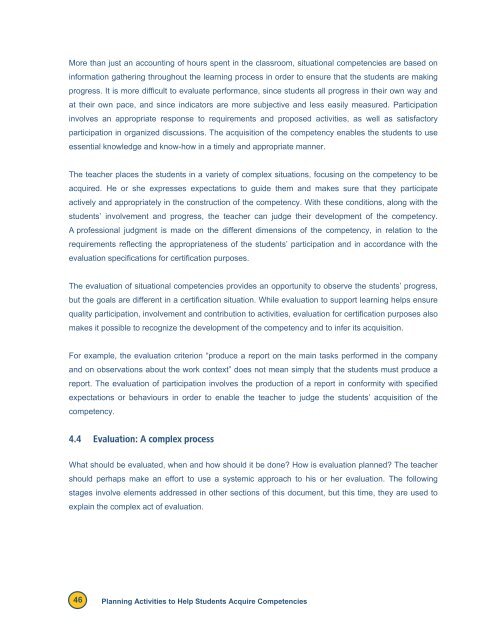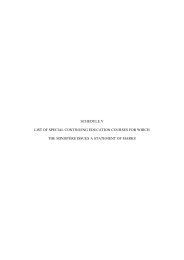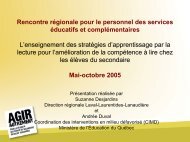Reference Framework for Planning Learning and Evaluation Activities
Reference Framework for Planning Learning and Evaluation Activities
Reference Framework for Planning Learning and Evaluation Activities
Create successful ePaper yourself
Turn your PDF publications into a flip-book with our unique Google optimized e-Paper software.
More than just an accounting of hours spent in the classroom, situational competencies are based on<br />
in<strong>for</strong>mation gathering throughout the learning process in order to ensure that the students are making<br />
progress. It is more difficult to evaluate per<strong>for</strong>mance, since students all progress in their own way <strong>and</strong><br />
at their own pace, <strong>and</strong> since indicators are more subjective <strong>and</strong> less easily measured. Participation<br />
involves an appropriate response to requirements <strong>and</strong> proposed activities, as well as satisfactory<br />
participation in organized discussions. The acquisition of the competency enables the students to use<br />
essential knowledge <strong>and</strong> know-how in a timely <strong>and</strong> appropriate manner.<br />
The teacher places the students in a variety of complex situations, focusing on the competency to be<br />
acquired. He or she expresses expectations to guide them <strong>and</strong> makes sure that they participate<br />
actively <strong>and</strong> appropriately in the construction of the competency. With these conditions, along with the<br />
students’ involvement <strong>and</strong> progress, the teacher can judge their development of the competency.<br />
A professional judgment is made on the different dimensions of the competency, in relation to the<br />
requirements reflecting the appropriateness of the students’ participation <strong>and</strong> in accordance with the<br />
evaluation specifications <strong>for</strong> certification purposes.<br />
The evaluation of situational competencies provides an opportunity to observe the students’ progress,<br />
but the goals are different in a certification situation. While evaluation to support learning helps ensure<br />
quality participation, involvement <strong>and</strong> contribution to activities, evaluation <strong>for</strong> certification purposes also<br />
makes it possible to recognize the development of the competency <strong>and</strong> to infer its acquisition.<br />
For example, the evaluation criterion “produce a report on the main tasks per<strong>for</strong>med in the company<br />
<strong>and</strong> on observations about the work context” does not mean simply that the students must produce a<br />
report. The evaluation of participation involves the production of a report in con<strong>for</strong>mity with specified<br />
expectations or behaviours in order to enable the teacher to judge the students’ acquisition of the<br />
competency.<br />
4.4 <strong>Evaluation</strong>: A complex process<br />
What should be evaluated, when <strong>and</strong> how should it be done How is evaluation planned The teacher<br />
should perhaps make an ef<strong>for</strong>t to use a systemic approach to his or her evaluation. The following<br />
stages involve elements addressed in other sections of this document, but this time, they are used to<br />
explain the complex act of evaluation.<br />
46 <strong>Planning</strong> <strong>Activities</strong> to Help Students Acquire Competencies




